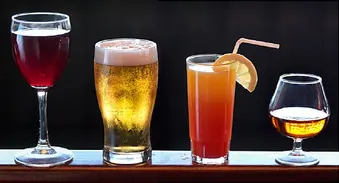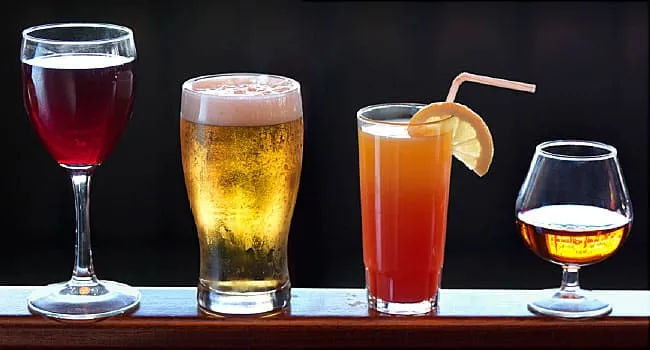Quiz: Alcohol Myths and Facts


Which of the following is a benefit of heavy drinking?
- Lower cholesterol
- Lower blood pressure
- Lower risk of cancer
- None of the above
There are no benefits to heavy drinking. It causes you to put on weight, lessens your mental focus, and makes you more likely to get cancer. It also boosts your odds of injury by accident or violence. One way or another, it plays a part in some 88,000 deaths a year in the U.S.
How many drinks per week make a woman a "heavy drinker?"
- 8
- 14
- 18
- 21
Toss back more than 3 drinks on any single day or more than 8 a week and you could be labeled a heavy drinker. The numbers for men are higher: 4 drinks a day or more than 15 per week. What’s a drink? Just 0.6 ounces of alcohol -- roughly the amount in 12 ounces of beer, 5 ounces of wine, or 1.5 ounces of 80-proof liquor.
Name a risk of heavy drinking.
- Diabetes
- Cirrhosis
- Cancer
- All of the above
There’s a long list of bad things too much alcohol can do to your health. You could be more likely to get diabetes, cirrhosis of the liver, and high blood pressure, or have a stroke. Quite a few types of cancer are tied to overdoing it as well. These include mouth, larynx, and esophageal cancers, breast cancer, plus cancers of the liver, gastrointestinal tract, and colon.
Heavy drinking can shrink your brain.
- True
- False
Long-term heavy drinking can shrink both the overall brain and the size of the brain's cells. The result: problems with learning, memory and problem solving.The longer and harder you drink, the more likely you’ll have trouble with sleep, mood, and motor skills. If you avoid alcohol, you might reverse some of the damage.
A few drinks could be good for your heart.
- True
- False
There’s some evidence that a limited amount of alcohol could make you less likely to get heart disease. It’s possible that alcohol raises levels of "good" cholesterol. However, the key word here is "moderation." Long-term heavy drinking weakens the heart muscle and can contribute to high blood pressure, stroke, and, heart failure.
Middle-aged and older occasional to moderate drinkers will outlive their teetotaler friends.
- True
- False
Doctors aren’t sure why, but once you hit middle age, there’s a link between an occasional drink and staying alive. It could be the protective effects of moderate drinking against heart disease, stroke, and diabetes.
If you don’t drink, start. It’s good for your heart.
- True
- False
If you don't drink, keep it that way. Health benefits aside, alcohol can make you more likely to get a disease or have an accident. And keep in mind, too, you can get similar health benefits without the risks from exercise and a healthy diet.
A glass or two of red wine can make you less likely to get:
- Heart disease
- Breast cancer
- Both of the above
- Neither of the above
Everyone thought that resveratrol, an ingredient in red wine, improved health. But new research shows it does not prevent heart disease or cancer, and it doesn't help you live longer.
Which has the most calories?
- 1 glass of red wine (5 ounces)
- 1 glass of white wine (5 ounces)
- 1 pina colada (9 ounces)
- 1 beer (12 ounces)
That glass of frosty, tropical, pina colada goodness weighs in at 460 calories. A regular beer is about 150 calories per bottle and a light beer 110. Wine is around 90-105 calories a glass.
Alcohol can keep your mind sharp as you age.
- True
- False
Although researchers caution that more study is needed, evidence suggests that light to moderate drinking in early adult life may help protect against dementia in later life. But the research results have been mixed. Two studies found that only wine had the protective effect while other types of alcohol may in fact increase risk of dementia. As with other potential benefits, these positive effects are associated only with light or moderate -- but not heavy -- drinking.
How much of all the alcohol Americans drink each year goes during binge drinking sessions?
- 15%
- 30%
- 50%
- 75%
Binge drinkers -- that’s women who have 4 or more drinks on one occasion or men who have 5 -- guzzle down more than half of all the alcohol we drink in the U.S. Binges accounts for 90% of all alcohol use for the under-21 crowd.Binges are linked to many health problems, from high blood pressure and heart attacks to sexually transmitted diseases and unintended pregnancy. Injury, violence, and suicide also go hand-in-hand with bingeing.
Most binge drinkers are alcoholics.
- True
- False
Most binge drinkers are casual drinkers who sometimes overdo it. This is a type of alcohol abuse, but alcoholism is a disease marked by a strong craving for alcohol, an inability to limit drinking, and continued drinking despite physical, psychological, or interpersonal problems.
Caffeine and alcohol make a dangerous pair.
- True
- False
Caffeine masks clues about your level of intoxication. Drinkers who mix alcohol and caffeine also are twice as likely to be taken advantage of sexually or to ride with an impaired driver.
Alcohol hits women harder than men.
- True
- False
Most women weigh less, so a drink delivers more of a punch. Women also have less water content in their bodies than men, so the alcohol doesn’t get as diluted.
